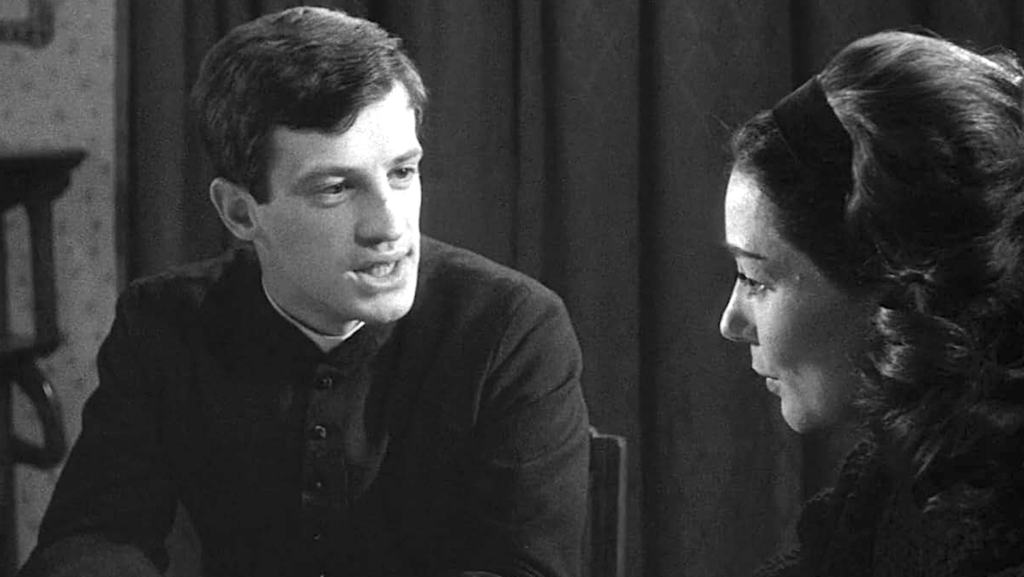“Léon Morin, Priest” is an award-winning 1961 black-and-white French film scripted and directed by Jean-Pierre Melville.
It’s also a kind of anti-“Fleabag” — the wildly popular TV series a few years ago featuring a priest and a free-wheeling sexual libertine who predictably fall into bed.
Born Jean-Pierre Grumbach, after working for the French Resistance, Melville adopted the new last name in tribute to his literary hero, the author of “Moby Dick.” Intensely private and notoriously curmudgeonly, he wore sunglasses not only in public and at interviews, but alone in his room while writing.
Known as a godfather of the French New Wave, Melville is best known for the war films “Le Silence de la Mer” (1949) and “Army of Shadows” (1969), and for ultra-cool crime dramas like “Bob le Flambeur” (1956), “Le Samouraï” (1967) and “Le Cercle Rouge” (1970). At first glance, he seems an unlikely candidate to direct a film about a man of God.
But as Volker Schlöndorff, who worked as Melville’s assistant in the early ’60s, once observed:
“His protagonists, whether resistants, gangsters or priests, are solitary ‘men without women.’ Driven by duty, they move inexorably towards their fate, which is often death.”
Melville had wanted to make “Léon Morin,” based on “The Passionate Heart” by novelist Béatrice Beck, for eight years. He first spotted Jean-Paul Belmondo, the ruggedly handsome ’60s sex symbol, at the Orly airport and knew instantly he had the face of the priest he’d been looking for.
The film takes place during World War II in Nazi-occupied France. Belmondo plays Léon Father Morin, the priest in a small town in the Alps. Emmanuelle Riva is Barny, a Communist militant whose Jewish husband has died in the war, a staunch atheist, and the mother of a small daughter.
One day, in a kind of larkish self-dare, Barny goes to the local church and enters the confessional. Morin, however, takes her anti-Catholic jibes seriously and engages her in discussion. The two — both of them young and attractive — begin an ongoing conversation and a relationship in and out of the confessional, fierce with emotion of various kinds on both sides.
Passion here is not sublimated. Thanks largely to the moral strength of the priest, it is rather offered up, with all the agony that inevitably entails.
Roger Ebert notes, “ ‘Léon Morin, Priest’ is a consistently intriguing film, because Melville so cleverly plays with our expectations.”
Morin, though altruistic, isn’t perfect. Of peasant stock, he’s blunt to the point of rudeness and also has a temper. He invites Barny to his spartan apartment and lends her books on theology and prayer. Bit by bit, her mind begins to open, but he’s often so brusque with her that you wonder why she doesn’t lash out or run away. She confesses her sexual fantasies to him, hoping he’ll be shocked, or take the bait, or both: he’s entirely unmoved.
She thrusts; he parries, refusing to resort to easy answers or pious platitudes. “I don’t take Communion often,” she announces at one point. “It brings me no joy.”
“You think it brings me joy?” Morin shoots back. “You ask too much of Communion.”
Here’s a typical exchange between the two:
“Do I give you the impression that I’m simple?” Barny asks.
“You don’t give me any impression.”
“What do you think of me?”
“Nothing.”
“When I stand before you like this, what effect do I have on you?”
“You have the effect of an embryo. It’s lying to oneself.”
“Lying? How so?”
“By assuming more importance than you have.”
Then the Angelus bell rings and he begins to pray: “The Angel of the Lord declared unto Mary…”
Morin resolutely resists her advances: At one point, Barny asks him whether, if he weren’t a priest, he’d marry her: he storms out in a rage. At the same time, he’s clearly as intrigued by Barny as she is by him, and in one scene seems purposely to brush up against her breast with his surplice as he passes her pew in church.
While she burns with hunger for him, she also longs for a father for her child. One night, he comes to her apartment and tucks the daughter in, praying over her bed. “I wanted to get him into my bedroom,” Barny ruefully thinks, “but I didn’t mean like this.”
But all the while, her faith is growing. This previously cynical, world-weary young woman with a crush on her female boss, opens, softens, asks of herself the hard questions, and begins to channel her strong will, intelligence, and discipline in a new direction.
Eventually Morin is called to a new assignment, to a provincial outpost that will mean little intellectual stimulation and much loneliness. He obeys without murmur or question.
Barny visits him as he packs up his books.
“No questions for me this last evening?” he asks.
“I’ll have them all my life, so better to keep quiet.”
“We’ll meet again,” he assures her.
“That’s just a figure of speech,” she says, weeping.
“We’ll meet again,” he repeats gently as they part. “In another world.”
Of playing the role, Belmondo said, “I found things inside me I didn’t know were there. … It opened a new path for me.”
As for Melville, this atheist Jew and filmmaker extraordinaire understood very well the perils of faith.
“There is always a precipice one must cross alone,” Morin tells Barny. “If there was proof, everyone would believe.”

